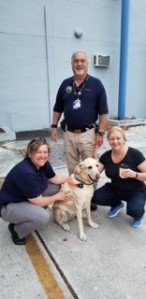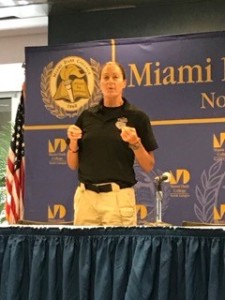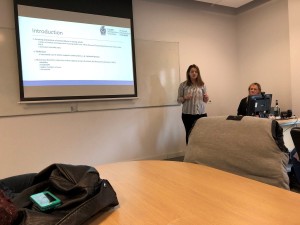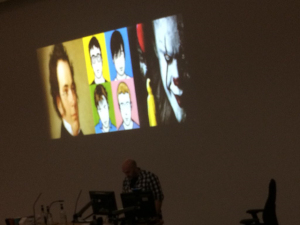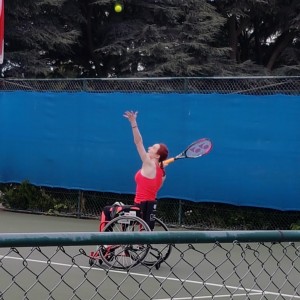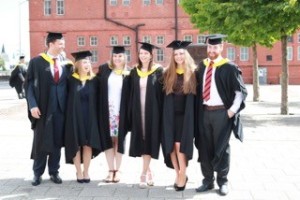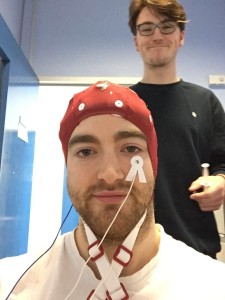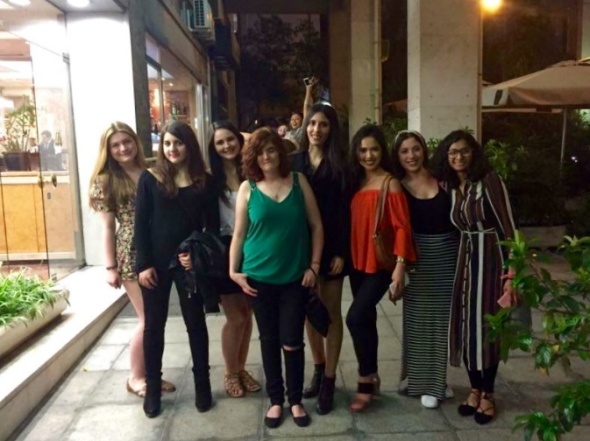Developing a career: A student’s experience
Posted: October 8, 2018 Filed under: Graduation, Professional Development, Psychology at Cardiff Met, Student Achievements, Uncategorized, Volunteering Leave a commentWe do like to hear from ex-students, especially as helping students develop skills and build confidence is at the heart of much of what we do. It helps us all realise the value of psychology and the skills it provides. We want the psychology that they are exposed to to be professionally relevant and to help them build their careers. We know from conversation and feedback that students want to make a difference to the world and to contribute to supporting people in all sorts of different ways.
This year we have a visit from the BPS to review our programme, and we have used this as an opportunity to reflect on the degree and make changes that will enhance the support we provide for our students. A part of this review will see the introduction of three new pathways, echoing the expertise in the department and the interests of our students. These are pathways in health, education, and forensic psychologies. These pathways will complement the psychology programme, building on its strengths in applied psychology.
As we have reflected on the programme, it is nice to look back on the experiences of some of our graduates. We have been offering placements in education settings through our links with First Campus for 10 years. These placements have helped inspire students to go and work further in education. One of of our ex-students, Donna Ward, has kindly written the below about her experiences as a student in Psychology at Cardiff Met and as a volunteer with First Campus.
It’s been three years since I graduated in Psychology from Cardiff Metropolitan, and on reflection, I can honestly say it was an all-round inspiring and supportive organisation. Cardiff Met provided a rich environment that encouraged me to develop personally, professionally and academically. As a BPS accredited course, it provided me with strong research skills, professional work experience through the educational psychology module, and contacts to other organisations to gain further paid experience. All of which has now led to me achieving a position as an Assistant Educational Psychologist, applying for the Doctorate in Educational Psychology.
Student development is at the heart of the organisation. The academic tutors on the psychology course are highly skilled, and compassionate, and use psychology to inform their work with students. A mixture of seminars, lectures, academic workshops, tutor evaluative feedback, and ongoing pastoral support help improve exam performance, essay writing, research skills, and most importantly academic confidence. The relationship I had with many of the staff at Cardiff Met, especially my personal tutor Dr Annette Daly, provided me with the support and encouragement I needed to get through my degree.
The Educational Psychology module fuelled what would become my future career. The content of the module sparked my interest, and the encouragement and feedback from the tutors inspired me to take it further. The module provided the opportunity to train as a student mentor and go into schools once a week and mentor secondary students. From this module I made links with a widening access organisation named First Campus, who aim to improve further education pathways for adolescents. I was offered the opportunity to interview as a First campus ambassador, allowing me gain paid experience delivering a weekly workshop to looked after children (LAC). I still talk about this experience at interview three years later.
I graduated from Cardiff Met feeling like I had developed good research skills and was competent in the use statistical software programmes and methodological analysis. I had developed good essay writing skills, and precision in scientific report writing through the completion of multiple reports, essays and a systematic review. All of which lead to my success in my MSc in Educational Psychology at UCL. Many of the assignments you complete on the undergraduate psychology course at Cardiff Met are of a similar format to what you will complete on the doctorate course, specifically the systematic review, research reports and final research project. I can honestly say I feel confident that I will be able fulfil the academic demands required for the Doctorate in Educational Psychology.
I graduated from Cardiff Met with so much more than a degree. I graduated with work experience, ambition and desire to make a difference in education. From completing my psychology degree in 2015 and gaining relevant work experience from the educational psychology module and First Campus, I was able to work in an adolescent psychiatric hospital as an Occupational Therapy Assistant, complete my master’s in Educational Psychology at UCL, secure a role as an Assistant Educational Psychologist, which has transitioned into my current role as a Senior Assistant Educational Psychologist. With this academic and professional experience, I am now in a position to apply to the doctorate in Educational Psychology.
Outward mobility to Florida [] Symudedd allanol i Florida
Posted: June 12, 2018 Filed under: About us, International, Professional Development, Psychology at Cardiff Met, Research, The Department Leave a commentOutward mobility to Florida
This year two colleagues in forensic psychology (Drs Nic Bowes and Karen de Claire) were successful in gaining funding for an outward mobility visit. Building strong international collaborations is vital to how we critically understand our own practices and knowledge, and helps us develop research into new areas, and to design courses to better support students. Here, Dr Karen de Claire outlines the trip, what was covered and some of the outcomes.
The Santander funding allowed us to visit the Miami Dade University. Miami Dade is the largest HE provider in the US, with more students than any other college. They lead the way in activities to widen access to study and improve employability for people who would not be typically expected to attend university. This University has a School of Justice and has similar practice concerns and research interests; weapon crime, violence and community issues related to offending. Miami Dade University were very interested in meeting and working with us and arranged an amazing itinerary. On arrival we met with the Dean of the School of Justice and his team and toured the campus. They explained the Police and Correctional Officer Academies that they run, which are both based on the psychological concept of procedural justice. A concept we are working on currently in the UK. They also talked about their role in promotion boards for criminal justice organisations, something we as a university could consider exploring.
We followed this with attendance at a gun crime conference, meeting gang leaders, victims, police chiefs and national experts. Obviously this is a huge issue for the American people. While it was great to see all of these groups working together with academics to deal with the problem, it was concerning to hear the message that the gun control laws are not widely or effectively applied. While we were in Miami there were a number of shootings including the murders of two high school students.
On day two of our visit we were invited to observe a disaster recovery exercise by Florida Emergency Mortuary Operations Response System (FEMOR). They had created a disaster scenario (terrorist attack) and had established a body recovery and identification exercise including the use of real human remains to test out all aspects of the emergency team response (including cadaver dogs). Miami Dade trains crime scene investigators and mortuary staff. In America they do not have Forensic Psychologists and our title confused them. This misunderstanding lead to them thinking we would be comfortable surrounded by cadavers and body parts. We were able to fake insouciance. It was fascinating to see how a mobile mortuary operates following a major incident of multiple deaths and it was great to see Bella the cadaver dog in action.
The trip gave us a wonderful insight into the way American university funding works and the entrepreneurial nature of the academics work. In the School of Justice all of the staff were practitioners in their field prior to joining the university and the ethos is innovation. The motto being try anything we will support you and if it works great. The academic team is multicultural and multilingual and southern hospitality was offered by everyone we met.
As part of their practitioner contact we were taken to a low security prison. Here we met the education, drug treatment and industries staff who work tirelessly to rehabilitate men who may have been in prison all their adult life. This experience was nothing like the view of American prisons presented by the media. Staff and prisoners worked alongside each other and showed considerable respect to each other. We met a group of 20 prisoners who had undertaken a treatment programme with university staff and students. They were welcoming to us and spoke positively about the experience as did the students.
On the final day we met the Virtual Campus team their professional approach was amazing with the University offering 300 MSc programmes on line. We learned how to develop our own programmes to provide a more blended learning approach and this discussion sparked many ideas for the future.
This turned out to be a very productive visit and has the potential to lead to the following collaborations, including research and student exchanges.
Our visit ended with a meeting with red Dragon radios Dr Johnny Love, but that is another story.
Symudedd allanol i Florida
Eleni, bu dau gydweithiwr mewn seicoleg fforensig (Drs Nic Bowes & Karen de Claire) yn llwyddiannus wrth ennill cyllid ar gyfer ymweliad symudedd allanol. Mae adeiladu cydweithrediadau rhyngwladol cryf yn hollbwysig i’r modd yr ydym yn deall yn feirniadol ein hymarfer a’n gwybodaeth ein hunain, ac yn ein cynorthwyo i ddatblygu ymchwil i feysydd newydd, a dylunio cyrsiau i gynorthwyo myfyrwyr yn well. Yma, mae Dr Karen de Claire yn amlinellu’r daith, yr hyn a gwmpaswyd a rhai o’r canlyniadau.
Caniataodd arian Santander i ni ymweld â Phrifysgol Miami Dade. Miami Dade yw’r darparwr AU mwyaf yn yr Unol Daleithiau, gyda mwy o fyfyrwyr nag unrhyw goleg arall. Maent yn arwain y ffordd mewn gweithgareddau i ehangu mynediad i astudio a gwella cyflogadwyedd ar gyfer pobl na fyddai disgwyl iddynt fynychu’r brifysgol fel arfer. Mae gan y Brifysgol hon Ysgol Cyfiawnder ac mae ganddi bryderon ymarfer a diddordebau ymchwil tebyg; troseddau arfau, trais a materion cymunedol sy’n ymwneud â throseddu. Roedd gan Brifysgol Miami Dade ddiddordeb mawr mewn cyfarfod a gweithio gyda ni a threfnwyd taith anhygoel. Ar ôl cyrraedd, gwnaethom gyfarfod â Deon yr Ysgol Cyfiawnder a’i dîm a theithio o amgylch y campws. Esboniodd yr Academïau Swyddog yr Heddlu a Chywirol maent yn eu rhedeg, sy’n seiliedig ar gysyniad seicolegol cyfiawnder trefniadol. Cysyniad yr ydym yn gweithio arno ar hyn o bryd yn y DU. Buont hefyd yn sôn am eu rôl mewn byrddau dyrchafiad ar gyfer sefydliadau cyfiawnder troseddol, rhywbeth y gallwn ni fel prifysgol ystyried ei archwilio.
Dilynwyd hyn gyda mynychu cynhadledd troseddau gwn, gan gyfarfod ag arweinwyr gang, dioddefwyr, penaethiaid yr heddlu ac arbenigwyr cenedlaethol. Yn amlwg, mae hwn yn fater enfawr i bobl America. Er ei bod yn wych gweld pob un o’r grwpiau hyn yn cydweithio ag academyddion i ddelio â’r broblem, roedd yn ymwneud â chlywed y neges nad yw’r cyfreithiau rheoli gwn yn cael eu defnyddio’n eang neu’n effeithiol. Tra’n bod ni yn Miami roedd yna nifer o saethiadau gan gynnwys llofruddiaethau dau fyfyriwr ysgol uwchradd.
Ar ddiwrnod dau o’n hymweliad, cawsom wahoddiad i arsylwi ar ymarfer adfer trychineb gan System Ymateb Gweithrediadau Brys Marwdy Fflorida (FEMOR). Roeddent wedi creu senario trychineb (ymosodiad terfysgol) ac wedi sefydlu adfer ac adnabod corff gan gynnwys defnyddio gweddillion dynol go iawn i brofi pob agwedd ar ymateb y tîm brys (gan gynnwys cŵn darganfod cyrff meirw). Mae Miami Dade yn hyfforddi ymchwilwyr lleoliad troseddau a staff marwdy. Yn America, nid oes ganddynt Seicolegwyr Fforensig ac mae ein teitl yn eu drysu. Arweiniodd y camddealltwriaeth hwn atynt yn meddwl y byddem yn gyfforddus o amgylch carcharorion a rhannau o’r corff. Llwyddom i ffugio dihidrwydd. Roedd hi’n ddiddorol gweld sut mae marwdy symudol yn gweithredu yn dilyn digwyddiad mawr o farwolaethau lluosog ac roedd hi’n wych gweld Bella y ci darganfod cyrff meirw yn gweithio.
Rhoddodd y daith gipolwg gwych i ni ar y ffordd y mae arian prifysgol America yn gweithio a natur entrepreneuraidd gwaith yr academyddion. Yn yr Ysgol Cyfiawnder roedd yr holl staff yn ymarferwyr yn eu maes cyn ymuno â’r brifysgol ac mae’r ethos yn arloesol. Yr arwyddair oedd rhowch gynnig ar unrhyw beth, byddwn yn eich cefnogi ac os yw’n gweithio, gwych. Mae’r tîm academaidd yn amlddiwylliannol ac yn amlieithog a chynigiwyd lletygarwch deheuol gan bawb a gyfarfuom.
Fel rhan o’u cysylltiad ymarferydd, cawsom ein tywys i garchar diogelwch isel. Yma fe wnaethom gyfarfod â staff addysg, triniaeth cyffuriau a diwydiannau sy’n gweithio’n ddiflino i adsefydlu dynion a allai fod wedi bod yn y carchar trwy gydol eu bywydau oedolion. Nid oedd y profiad hwn yn debyg i farn carchardai America a gyflwynwyd gan y cyfryngau. Roedd staff a charcharorion yn gweithio ochr yn ochr â’i gilydd ac yn dangos cryn barch at ei gilydd. Cyfarfuom â grŵp o 20 o garcharorion a oedd wedi ymgymryd â rhaglen driniaeth gyda staff a myfyrwyr y brifysgol. Roeddent yn groesawgar i ni ac yn siarad yn gadarnhaol am y profiad fel yr oedd y myfyrwyr.
Ar y diwrnod olaf, gwnaethom gyfarfod â thîm y Campws Rhithwir, roedd eu hymagwedd broffesiynol yn rhyfeddol gyda’r Brifysgol yn cynnig 300 o raglenni MSc ar-lein. Fe wnaethon ni ddysgu sut i ddatblygu ein rhaglenni ein hunain i ddarparu dull dysgu mwy cymysg a thaniodd y drafodaeth hon lawer o syniadau ar gyfer y dyfodol.
Bu hyn yn ymweliad cynhyrchiol iawn ac mae ganddo’r potensial i arwain at y cydweithrediadau canlynol, gan gynnwys ymchwil a chyfnewidfeydd myfyrwyr.
Daeth ein hymweliad i ben gyda chyfarfod gyda Dr Johnny Love, red Dragon radios, ond stori arall yw honno.
Para-athletwr elit yn y gamp tenis cadair olwyn, a myfyriwr Seicoleg
Posted: March 8, 2018 Filed under: About us, Professional Development, Psychology at Cardiff Met, Student Achievements, Welsh Leave a commentMae Fran Smith yn fyfyrwraig lefel 4 ar y cwrs BSc Seicoleg ym Mrhifysgol Metropolitan Caerdydd. Yma, mae hi’n dweud wrthym am rhan arall pwysig iawn o’i bywyd ble mae hi’n hyfforddi fel chwaraewr tenis cadair olwyn a sut mae Seicoleg wedi helpu gyda hyn.
Fy enw yw Fran Smith, rwy’n 18 oed, ac yn bara-athletwr elit yn y gamp tenis cadair olwyn. Cefais gyfle i fynychu fy ngwersyll tenis cadair olwyn cyntaf ar 05/06/17 ac ar hyn o bryd rwyf wedi cyrraedd y brig o blith merched iau Prydain ac yn dal safle 38 o blith merched iau y byd. Ar hyn o bryd rwyf yn fy chweched mis o chwarae ac yn ystod y cyfnod hwnnw rwyf wedi ennill yr aur mewn tenis merched iau i senglau a pharau yn y British Open yng Ngemau Ysgolion 2017.
Mae hyn yn swnio’n dipyn o gamp, tydi? Efallai fod hynny’n wir, ond wnes i ddim eistedd mewn cadair olwyn chwaraeon gyda raced tenis a datblygu’r gallu anhygoel i chwarae.
Roeddwn i eisoes wedi chwarae tenis am 13 mlynedd gan ddefnyddio fy nghoesau. Ond erbyn imi gyrraedd 16 oed roedd rhaid i mi roi’r gorau iddi oherwydd nid oedd fy nghorff yn ymdopi, ac roedd y perygl o wneud niwed difrifol i’m coesau yn rhy uchel. Am 6 blynedd rwyf wedi bod mewn brwydr gyda’m corff a gyda’r Gwasanaeth Iechyd. Gyda’i gilydd, rwyf wedi gweld 6 ffisiotherapydd (2 arbenigwr), 2 rhiwmatolegydd, 1 niwrolegydd, 1 arbenigwr clust-trwyn-gwddf (ENT) ac un meddyg teulu pryderus dros ben.
Pe byddech chi’n fy ngweld i, fyddech chi ddim yn meddwl bod gen i anabledd (rwy’n dal i aros i rywun ddod i weiddi arnaf mewn maes parcio na ddylwn i fod yn deilwng i gael bathodyn glas), yn bennaf oherwydd fy mod i’n gallu cerdded.
Mae seicoleg yn hanfodol i mi, yn enwedig gan fy mod yn dod yn fy mlaen mor gyflym yn fy nghamp. Y llynedd, roeddwn i’n drist drwy’r amser, yn fwy trist nag arfer, oherwydd doedd gen i ddim chwaraeon yn fy mywyd, ac yn teimlo bod gen i ddim byd i’w wneud, dim uchelgais, ac yn y bôn, dim bywyd. Roedd y tristwch hwn yn gwneud imi fyw yn fy mhen yn ormodol a gor-ddadansoddi pob manylyn fyddwn i’n ei gael. Wrth lwc, llwyddais i roi trefn ar fy hun cyn imi droi yn gadach llestri am weddill fy oes!
Mae fy nghwrs seicoleg wedi fy helpu i mewn sawl ffordd. Un o’r pethau pwysicaf rydw i wedi ei ddysgu yw sut mae eich gwrthwynebwyr yn mynd i ymateb mewn gêm; beth mae eu hosgo, eu hedrychiad, eu safiad, eu symudiad a’u patrwm o chwarae yn ei ddweud wrthyf. Ond mae un peth sydd hyd yn oed yn bwysicach na’r rheiny; fy seicoleg fy hun. Yr elfen fawr yw fi fy hun yn byw y tu mewn i’m pen ar y cwrt oherwydd, wrth gwrs, mewn gêm senglau, dim ond chi a’ch gwrthwynebydd sydd yno. Rwy’n gwybod nawr os oes rhywbeth yn mynd o le ar y cwrt bod angen i mi newid pethau yn y fan a’r lle, ac yna, mae angen meddwl beth all fynd o le a pham.
Enghraifft wych yw’r gystadleuaeth ddiwethaf yr oeddwn i’n cystadlu ynddi, sef y Wheelchair Tennis Nationals cyn y Nadolig 2017. Collais y gêm gyntaf achos ’mod i’n teimlo fel pe bai gen i gartŵn o geiliog deri yn fy mhen. Yn hytrach na chanolbwyntio ar fy ngwrthwynebydd, roeddwn i’n meddwl yn ormodol am yr elfennau yn fy arddull i. Ar ôl imi gael ychydig o amser i feddwl, sylweddolais mai’r rheswm roeddwn i wedi colli’r gêm oedd fod gormod o bobl wedi bod yn gofyn imi beth oedd fy nghynllun ar gyfer y gêm, sut oeddwn i am eu trechu nhw, pa strategaethau oedd gen i, ac ati. Mae gormod o hyn cyn mynd allan i chwarae yn gallu bod yn llethol.
Diogel yw dweud, erbyn imi chwarae’r gêm gysur gyntaf, roeddwn i wedi rhoi’r gorau i’r ceiliog deri, ac wedi dileu popeth o’m meddwl. Canolbwyntiais ar ddim ond chwarae tenis, ac yn sgil hynny, llwyddais i ennill y rownd gysur a churo dwy ferch sy’n cystadlu yn fy erbyn am le yn nhimau Prydain. A dweud y gwir, yn ystod y ddwy gêm honno, doeddwn i ddim yn teimlo bod gen i ymennydd, yr unig beth yn fy mhen oedd pêl denis.
Yn amlwg, dim ond camau bychain ar y daith yw’r rhain, ond mae seicoleg wedi dysgu un peth i mi, mae wedi fy nysgu i stopio a meddwl. Ac os nad oes gennych chi fawr ddim synnwyr cyffredin, fel fi, mae hynny yn rhywbeth pwysig dros ben.
A Journey to Graduation… and Beyond!
Posted: February 2, 2017 Filed under: Professional Development, Psychology at Cardiff Met, Student Achievements, The Department 1 CommentOne of our recent graduates recently completed writing a blog for us. Owayne worked really hard as a student, and took the opportunities that the programme offered. It is great to see how he engaged with the programme and to know what he plans to do now.
I recently graduated with a 1st class degree in Psychology from Cardiff Metropolitan University, something that from the outset I would have never imagined in my wildest dreams. My University experience began in August 2012, when I decided almost on a whim to visit the UCAS website and see if I could access higher education through the ‘clearing’ process. I was uncertain as to whether such access was possible, because I had achieved very little in college academically. I had studied Maths (grade E) and Design Technology (grade U) three years prior, evidently and my motivation was poor. After college I focused on working with children with additional learning needs, and these experiences taught me the significant role that Psychologists play in understanding developmental conditions. Owing to this, despite it being completely new to me, I decided to apply for Psychology as a subject – without having any other real plan or direction in life. I was accepted onto the Foundation in Social Sciences, which had a pathway leading to Psychology.
So there I was, ready to begin university a few weeks later in September, with a history of poor grades, and little or no understanding of the subject I was about to pursue. Therefore, it would be fair to say that when compared to many of the other people starting on the course I was not in the best of positions. However, like everyone else, I quickly realised how interesting Psychology is. When I went to the effort of reading around the various modules I had assignments for, I found it was a tolerable and even rewarding way to spend my time. One of my favourite things about Psychology is how the information you learn can relate to and be applied to real life. This is especially true of when attempting to understand the behaviours and opinions of other people. I also found that other people tend to view Psychology as a particularly interesting subject, and this increases when the matter of conversation involves the research that is conducted.
As I progressed through my first year at University, I learned that, despite past shortcomings, anyone is able to succeed so long as they choose to take an interest. Psychology is fantastic in teaching people this idea from the very outset, that is how humans learn. I feel students should be taught this much earlier in their education. Theories on how humans remember information (great for exams), how they are motivated, and perhaps most importantly, how belief that learning is always happening helps us to develop and grow our brains further (it causes us to be more effortful) is helpful to understand how we learn. I found this to be of particular importance, because I attribute my success in university to the effort and time I put into the work I handed in. However, we came to understand that putting our best into our assignments not only improved the grades we attained, but also advanced the skills and writing techniques we needed if we were to get 70+ (a first) in the long run.
To summarise, thanks to Psychology at Cardiff Metropolitan University I have a goal for my future that before I could never have even dreamed of. This year I will be gaining experience as an Educational Psychologist Assistant whilst I apply to a doctorate course in Educational Psychology. Not only is this career path very well paid, but I will also be able to continue to work with people with Additional Learning Needs, and even support them on a much larger scale, which is something I always thoroughly enjoyed. By accessing the support that is available from the tutors and various other services, my career path was offered something I had not previously thought possible – a fresh start.

Shirley had this to say about looking after Owayne:
It is hard to believe that it has been four years since Owayne joined our Foundation leading to BSc/BA in Social Sciences course, and three since he transferred to the BSc (hons) Psychology course here at Cardiff Met – my memory is so fresh that it seems like only yesterday!
Owayne’s determination, to work to the best of his ability in his studies, was obvious from the start. A testimony to this dedication is the fact that he won the British Psychological Society prize for Best Performing Student at his Graduation. This prize was very well deserved, along with his first class BSc (Hons) Psychology degree.
His innovative approach to his work often revealed an ability to integrate his learning effectively across different psychological perspectives. Owayne’s motivation and intellectual capacity demonstrate the potential for successful research in a postgraduate study – I look forward to hearing from him when he gains his PhD in Educational Psychology!
However not only has he been outstanding in his commitment to his own studies over the last four years, but I also know that he played an integral role in encouraging and supporting his peers throughout this time.
Owayne is a credit to this university and I have no doubt that he will succeed in his future career. It has been both a pleasure and a privilege to have been his personal tutor during this time.
My Experience of Psychology Placements at Cardiff Met!
Posted: November 23, 2016 Filed under: About us, Professional Development, Psychology at Cardiff Met, Student Achievements, Volunteering Leave a commentWe have been offering volunteering opportunities within the BSc (Hons) Psychology programme for a number of years, and have rapidly expanded the number of organisations that we work with in the last four years. The placement opportunities offered in the second and third year provide students with work experience and helps them develop other practical skills that supplement and support the academic side of the programme. Hannah Rowlands recently published a guest blog (http://studentblogs.cardiffmet.ac.uk/a-day-in-the-life-of-a-third-year-psychology-student/ ) about her routines at Cardiff Met, which made us think it would be interesting to ask if she would write something more specific for us. Here is her blog about volunteering:
I chose to study psychology at Cardiff Met primarily because of it is applied nature. This course stood out to me as it allows its undergrads to develop a range of important employability skills. These skills are developed through the vast range of placement partners on offer!
Hence I chose to do the second year option Work, Volunteering and Placement module. Through this module I could apply for a range of placements Cardiff Met offers, such as placements in clinical settings to charity based community projects. There were so many to choose from and I was really unsure of which direction to head in but eventually I applied for Safer Wales Inclusive Service. This involved one-to-one and group sessions with a focus of encouraging positive lifestyle choices to the service users at risk of sexual exploitation. During the course of this placement I was given the opportunity to complete mentoring training. This consisted of a day’s workshop going thorough all aspects of mentoring, and afterwards we were expected to complete a booklet to evidence our understanding. These were then marked by our supervisors at Safer Wales and we were informed if we had passed the course. This helped me a lot on my placement when advising and mentoring the service users, and will aid me in the future on other projects.
The placement supervision consisted of the placement provider completing an assessment grid evaluating my personal employability skills. Additionally, I had to complete a placement incident report. The focus of this was to evaluate my response to an incident of my choice that occurred during the course of my placement. I had to justify the reasons for my behaviour and what I would do differently in future to respond to a similar situation.
Due to the rewarding nature of this placement I also applied for extra volunteering at Whitchurch Hospital through a charity called Student Volunteering Cardiff. Throughout the volunteering I worked with adults who had an acquired brain injury. This was a really interesting experience as working in a clinical setting allowed me to see the difficulties the patient’s face when having mental health issues.
As you can imagine both of these volunteering programmes helped me to develop many key skills, like working in a confidential manner in professional settings, understanding appropriate ways to communicate with both professionals and service users and my confidence and ability to lead activities with service users. These skills will prove important in my later career in psychology. With this in mind I would definitely recommended anyone to get involved in the amazing number of placement partners Cardiff Met has to offer. Not only will it help you develop important skills and be great experience for your CV, but most importantly it is really rewarding and helps you see psychology applied in the real world!
We think it is great that Hannah recognises how she is developing and building skills. The Module Leader, Alison Walker, added this:
Community based placements offer students the opportunity to apply their learning in a range of contexts and gain valuable experience for their CV, whilst at the same time learning about the issues that impact on the local community. The model used by the department means that students are supported through the application process and are provided with 1:1 support for their individualised assessments. It’s great to see how Hannah recognises how she has developed skills in professional contexts.
Psychology Visit: Athens
Posted: July 21, 2016 Filed under: Athens, CUC at Athens, Erasmus, Psychology at Cardiff Met, Student Achievements, The Department Leave a commentDeveloping the cultural capacity of Cardiff Metropolitan University students through internationalising the curriculum is a key theme in our learning and teaching strategy. As such, our Psychology Study Abroad Week went a long way toward achieving this. Dr Clare Glennan and Dr Tina Alwyn accompanied 11 Psychology students from Levels 4,5 and 6 to Athens during the Easter break. City University College (CUC) and our Cardiff Metropolitan students integrated very well and discussed the importance of culture and diversity within the discipline. CUC and Cardiff Metropolitan students developed relevant presentations and delivered these through joint symposiums. There was debate about internationalisation and what this meant for the students and how their future careers in Psychology would be influenced by these factors. The staff from both universities met and discussed how internationalisation could be facilitated through shared experiences, teaching and joint teaching. All in all this was an enriching and enjoyable experience for all involved.
Charlotte Hepburn
I am a second year Cardiff Metropolitan Student, who was accepted to go on the Psychology Study Abroad week. This took place in City Unity College (CUC) Athens in April this year. It was an amazing experience, amongst the many highlights were the cultural historical sights and exploring the amazing city that it Athens; it helped that it was 24 degrees and bright sunshine!
At first when I was told we were going I was very excited but the thought of sitting in on lectures and contribute to a symposium was daunting and I even thought It might have been a bit boring. However I could not have been more wrong, the lecturers were fascinating, and we were particularly impressed by one who presented a lecture on forensic psychology. The symposium was also really great. It was interactive and offered such an eye opening experience in how both cultures view each other and themselves.
It was also an excellent opportunity to meet the Athenian students who are studying the same Psychology degree. They were all so welcoming and friendly and we had a real laugh with them and bonded really well. The trip gave me a real insight into how other cultures live, it was fascinating to see first-hand the everyday lives of people from another culture. I feel I have been able to apply this into my work; thinking critically about psychological research and its applicability to other cultures.
I was also really taken a back at how close all of the students that went on the trip became. It was an opportunity for Cardiff Metropolitan students from across all levels to come together and bond as a group. It was also lovely to meet the Athens student, some of whom I have stayed in contact with and will probably remain my friends for life.
If I could recommend you do one thing this year it would be to apply for the Athens trip!
Hannah Rowlands
This year I was able to attend the Psychology study abroad week, it was amazing experience and I thought I would share with you!
Firstly, I really enjoyed the lectures, considering psychology from a different perspective was so interesting. During our visit we were able to present at an Internationalisation Symposium. In preparation our lecturer split us into groups and each group were assigned a task. The focus for my group was looking at the impact of child poverty in Wales and illustrating from a psychological perspective, how poverty can impacts upon the individual. The symposium and the visit in general highlighted the importance of culture to me especially after the internationalisation discussion and this has helped me so much with my academic understanding of culture, especially when considering social psychology.
The Greek students and lecturers made us feel so welcome at the CUC and it was really nice talking to them about their psychological interests and ideas. This really helped spark some ideas from my dissertation for next year!
Finally, the group of Cardiff Met students we went with were amazing, we all got on so well and we have all stayed in contact, speaking almost every day! The trip was a great way to meet people in higher and lower years as I was able to give advice to the L4 students but also seek advice for module and dissertation ideas from the L6 students.
Thank you so much for the opportunity to attend, I really enjoyed it and found it such a valuable experience!
Dr Dan Heggs, Programme Director for Psychology, says “It’s great to see that out staff and students have once again visited CUC in Athens. As we build the links between the two programmes it is clear that we can all learn from one another, and that the opportunities given to the students from both colleges to come together enables them to think about how psychology can be applied in broader cultural contexts.” Dr Amie-Louise Prior, Moderator for the BSc Psychology Programme at CUC, says “This trip provides an excellent opportunity for students to gain experience of teaching and learning within a different cultural setting. Symposium and discussion sessions encourage students to discuss and share their ideas relating to the topic of Psychology and develop presentation and networking skills.”
We look forward to further trips to build the relationship with Athens and to allow more students to experience psychology in Athens!
Applied Cognitive Expertise: Networking Event
Posted: April 20, 2016 Filed under: About us, Psychology at Cardiff Met, Research Leave a commentOn Monday 4 April 2016 the Applied Cognitive Expertise held its first networking event at Cardiff Metropolitan University. The day was an opportunity for researchers, both inside and outside the university, to disseminate and discuss a range of diverse topics in an informal and relaxed environment.
Sessions were held on Distraction and language; Decision-making and reasoning; Emotion, mood, and cognition; and Hedonic cognition. Within those sessions, for example, Dr Robert Mayr talked about how native languages sound foreign, Dr Nick Perham informed us how a deficit in processing order information may explain some features of dyslexia, Dr Niall Galbraith explored how jealousy and paranoia are (not) associated with data gathering, Dr Andy Watt explained how decision-making in psychiatry is not as optimal as it should be, Professor Phil Reed examined how schizotypy and internet use are related to each other, Dr Deiniol Skillicorn focused on a novel Stroop methodology to explain cognitive control deficits schizotypy, and Dr Martin Graff regaled us with decision-making in online dating. To round things off, Professor Bob Snowden gave us an insight into the cognitive underpinnings of psychopathic individuals replete with fascinating anecdotes of his research experience.
We are very grateful to all those who presented and attended and hope to organise a similar event next year.
Some feedback from the event:
Professor Phil Reed from Swansea University felt that the “day achieved three main things: 1) it allowed me to make some contacts with people doing similar work to me, so that we can develop research collaborations; 2) it kept me up to date with research in the local area, and a bit beyond; and 3) it was a good research conference in itself”.
Professor Bill Macken from Cardiff University said that “the Applied Cognitive Expertise networking event organised at Cardiff Metropolitan Uni provided a broad and stimulating forum for discussion of the of ways in which the methods and concepts of cognitive psychology could be usefully applied to a variety of ‘real world’ settings and problems. As a showcase for the range of research expertise in the area, it will hopefully provide a starting point for valuable collaborations in the future”.
Dr Martin Graff from the University of South Wales commented that “the day enabled me to discuss and make contact with several colleagues from different institutions sharing research interests to my own. I have now had the opportunity to contact delegates with the idea of conducting further research in cognate areas”.
Dr Simon Dawson from Cardiff Metropolitan University initially was “a little sceptical to attend as many aspects were not directly related to my field of expertise. However, with the high calibre of speakers, well designed presentations and regular breaks to interact made the day worthwhile. There was a clear synergy between each speaker, highlighting the sterling efforts the psychology department had put in organising this event. This has opened ideas for potential collaborative research within areas I had not considered before. Looking forward to the next event”.
Professor Bob Snowden from Cardiff University “was really pleased to get a chance to hear of these activities taking place on our doorstep. I hope the enterprise of the Applied Cognitive Expertise Network can continue to bring together scientists and practioners from our region to form strategic collaborations and exchange ideas”.




